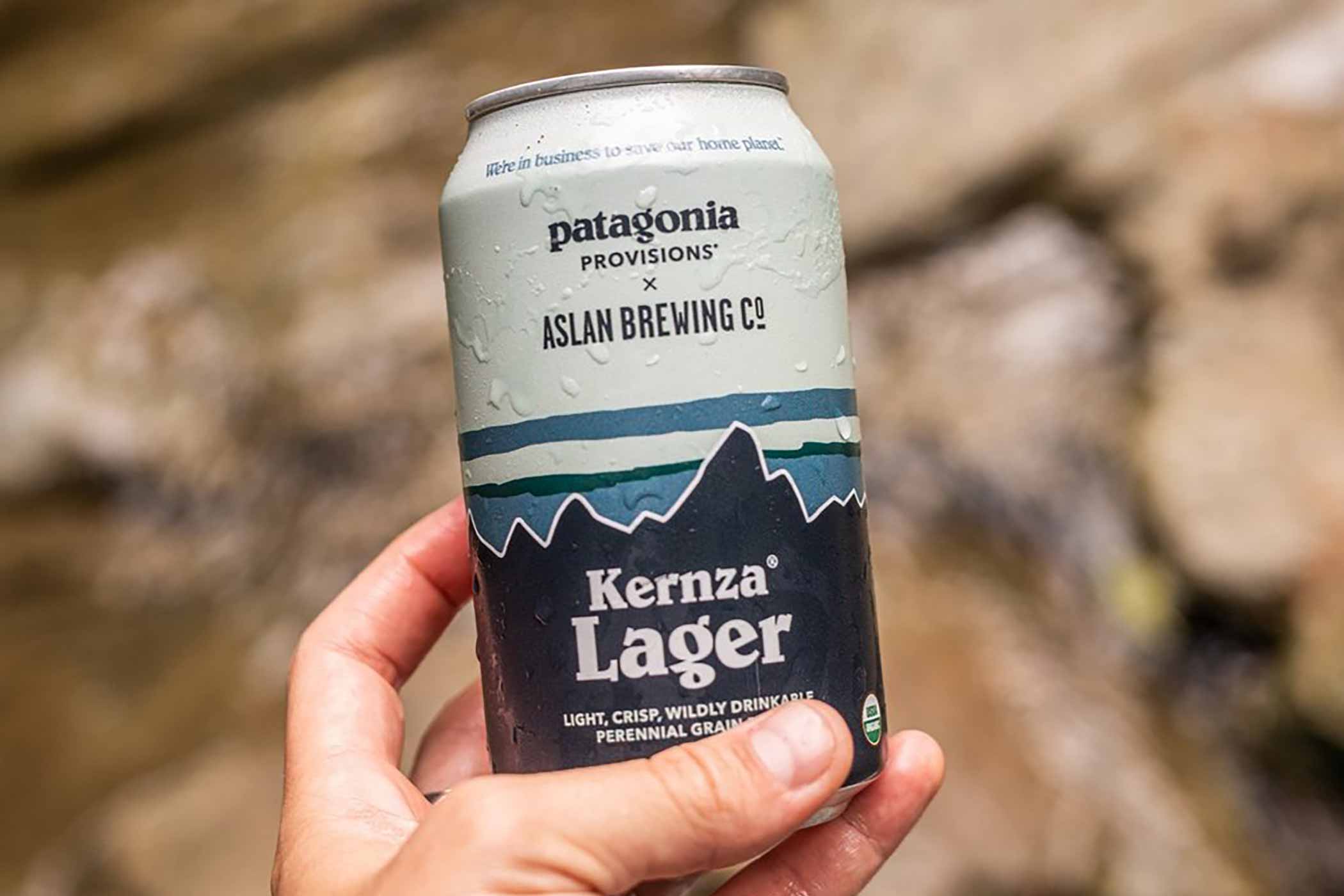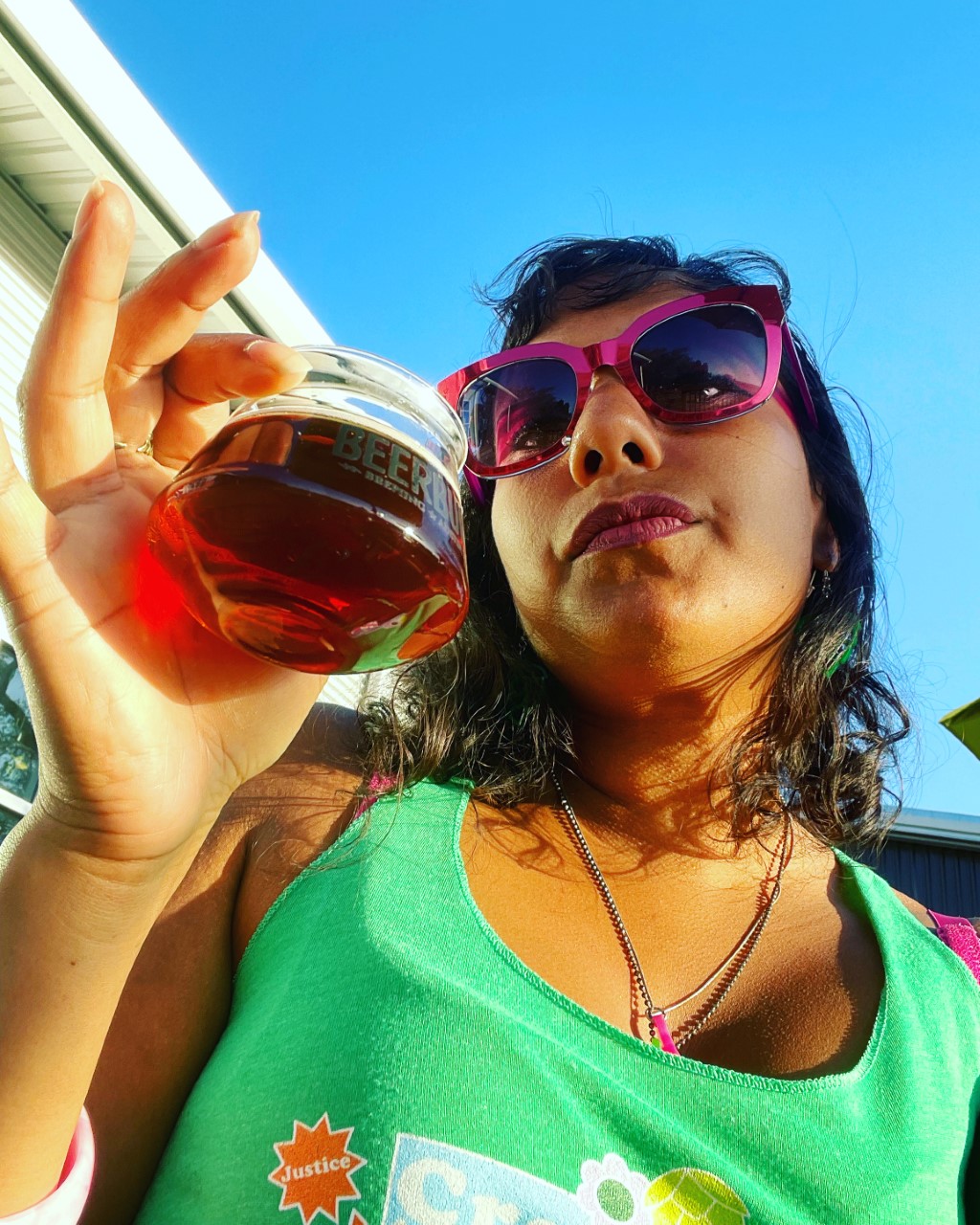Shop
Patagonia Provisions Launches First National Regenerative Organic Certified® Kernza® Brewing Project
Food for thought.
Looking for More?
When we make the beer we love, we use significant amounts of precious resources, particularly water, grains, and energy. But thanks to the growing climate crisis and rising cost of ingredients, environmental awareness has increased in the industry. Macro and craft breweries alike have begun seeking new ways to become more sustainable, including using solar panels, carbon capture systems, mash filter presses, and spent grain recycling. However, reducing the impact of the commercial farming of the annual grains used in brewing, such as barley, wheat, and maize, has yet to be addressed. Until now, with a new grain called Kernza®.
Most recently, Patagonia Provisions launched a nationwide initiative with The Land Institute to scale up farming production of Regenerative Organic Certified® crops, specifically the perennial grain Kernza, partnering with a group of like-minded breweries to show off the grain’s potential.
The group, including Sierra Nevada (CA/NC), Arizona Wilderness (AZ), Hopworks (OR), Russian River (CA), Allagash (ME), Rhinegeist (OH), Bang (MN), Aslan (WA), Odell (CO), Topa Topa (CA), and Maui (HI) have brewed with Kernza to show off its potential to create a more sustainable industry.
What Is the Goal of Brewing With Kernza?
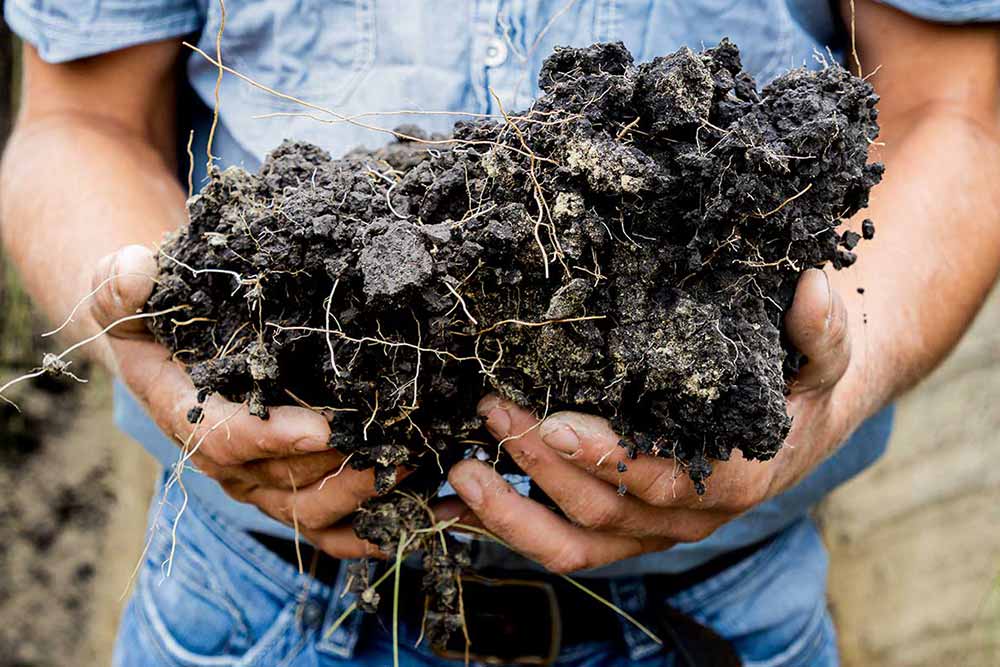
Photography courtesy of Patagonia Provisions
The project’s overarching goal is to grow demand for Kernza so that more farmers will swap out their soil-damaging annual grains for soil-protecting perennials, helping preserve the planet through brewing.
While this may sound challenging, the project’s leaders at Patagonia Provisions have substantial experience supporting and promoting sustainable social and environmental causes.
In 2012, Yvon Chouinard created Patagonia Provisions as the food and beverage arm of Patagonia. As a Certified B Corp, the well-known clothing and outdoor gear company has a strong ethical, environmental, and activist ethos, supporting grassroots organizations working on sustainability for over forty years. Patagonia moved into food and beverages over ten years ago to expand the company’s original mission by promoting activism-as-eating, selling only Regenerative Organic Certified products, and supporting regenerative farming practices.
You may not have been aware of this while shopping to gear up for your next hike or bike ride, but Patagonia’s self-imposed one-percent environmental tax has funded causes ranging from species preservation to environmental justice for indigenous communities.
So, what does all this have to do with beer?
When Patagonia Provisions discovered that Kernza could be used for brewing beer, they saw an opportunity to help the industry reduce its environmental impact.
What Makes Kernza Perfect for Beer?
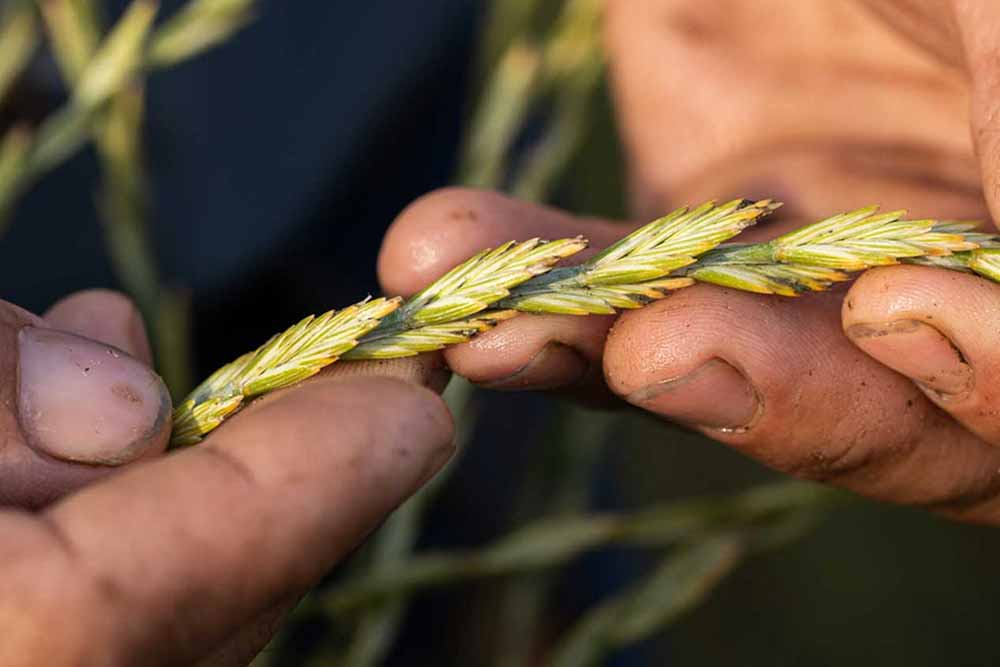
Photography courtesy of Patagonia Provisions
So, what exactly is Kernza? Why is it suitable for brewing? And how does using it help reduce the beer industry’s carbon footprint?
Kernza is a domestically cultivated perennial grain whose roots come from a breed of intermediate wheatgrass used as a foraged crop for livestock in Western Asia.
Perhaps that doesn’t sound too appetizing. However, The Land Institute’s team of expert scientists, ecologists, food technicians, and researchers (to name a few) have slowly developed the grain to become a viable and tasty source of human nutrition.
But why develop Kernza when we have many other edible crops?
Unlike annual grains, perennials do not need replanting yearly, saving farmers the expense and carbon usage that annual tilling creates. Because perennials have very deep roots (up to ten feet underground), planting them prevents erosion and improves soil structure, allowing it to hold more rainwater and drawing carbon into the ground through its roots. This process, known as carbon sequestration, helps prevent climate change.
Using less water, fewer pesticides, and less energy and helping to reduce carbon emissions, Kernza may sound like it’s too good to be true. But this is precisely why The Land Institute in the U.S. and other global organizations are cultivating Kernza.
The fact that it is a grain suitable for beer production and food is a huge bonus, something the industry cannot ignore. Kernza’s potential to reduce waste, water usage, and carbon emissions while promoting soil integrity could help future-proof commercial brewing.
This realization spurred the launch of the project.
“Patagonia Provisions created its new brewery partnership program to incentivize breweries to make beer with more perennial grains,” says Paul Lightfoot, Patagonia Provisions’ general manager. “Breweries have the potential to move the industry toward a more regenerative future.”
Introducing This Grain to the Brewing Industry

Photography courtesy of Patagonia Provisions
A nonprofit science-based research organization, The Land Institute strives to develop sustainable food production methods to protect the soil, including cultivating perennial grains.
It has been developing the Kernza grain since its foundation in 1976 (although the grain has a much longer history), registering the grain’s official trademark in 2011.
Patagonia Provisions began supporting Kernza’s development to help accelerate the timeline for making it consumable. Following a succession of breakthrough developments in Kernza domestication, they partnered with Portland’s Hopworks Urban Brewery to release Long Root Pale Ale, their first Kernza collaboration beer, in 2016.
A fellow Certified B Corp company, Hopworks, has a history of focusing on sustainable brewing, making the brewery the perfect fit for the project.
“We had been brewing with organics and running a sustainable brewery since our inception in 2007 and naturally found the Kernza project very intriguing,” says founder and brewmaster Christian Ettinger. “We immediately hit it off, and within a year, we brewed five pilot batches and had Long Root Pale Ale in the market.”
Hopworks made the pale ale with organic two-row barley, organic yeast, and a blend of organic Northwest hops. “As a Southern California company full of surfers and climbers, we thought a thirst-quenching style like pale ale was the perfect showcase for this unique new ingredient,” says Ettinger. “An inclusive, light-bodied and flavorful beer was more likely to get beer drinkers to welcome this new ingredient into their favorite lifestyle beverage and thus begin a discussion around regenerative organics.”
Based on the beer’s success, Hopworks made an additional six Kernza beers, five of which Patagonia Provisions sells to its Japanese market.
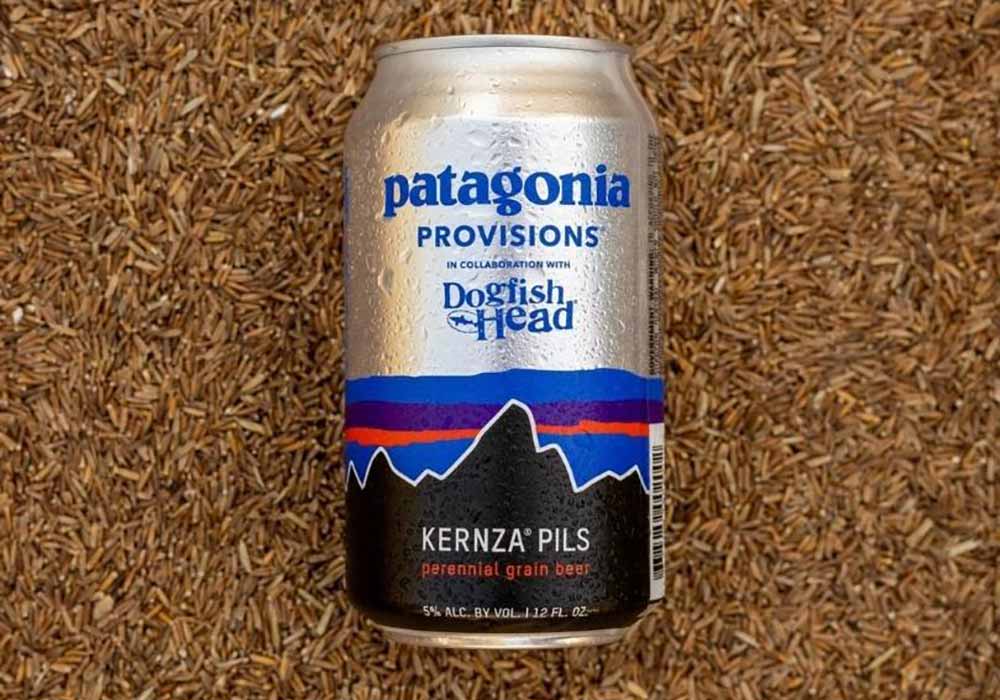
Photography courtesy of @dogfishhead
A collaboration with Dogfish Head followed, with the release of their Kernza Pils in 2021.
However, Patagonia Provisions wanted to bring Kernza to a broader audience, expanding with an additional ten breweries this year and focusing on lager—the most popular beer style in the U.S.
“If we want to scale regenerative and organic ingredients like Kernza, we need more farmers growing it and more food and beverage companies utilizing it,” says Lightfoot. “Perennial crops have the potential to radically improve our food systems, but we need critical mass.”
Patagonia sought out breweries with proven and ongoing commitments to sustainability and brought together a group of companies with a shared ethos to develop the project further.
Known for its multi-pronged environmental initiatives, including carbon capture, water reuse, and solar power, Sierra Nevada Brewing was a natural fit.
“Given our longstanding commitment to sustainability, Patagonia invited us to join the project along with other like-minded craft breweries,” says Mandi McKay, director of environmental and social impact at Sierra Nevada Brewing Co. “They also knew about our own investments in estate agriculture and that Sierra Nevada understands the importance of driving awareness for regenerative agriculture, innovation, and resilient systems.”
Serendipitously, in 2017, Saint Paul’s Bang Brewing Company began a Kernza brewing project with the University of Minnesota and The Land Institute. The series, called Perennial Percent, uses exclusively organic ingredients. So when the opportunity came to work with Patagonia, they were keen to be involved.
“When Patagonia reached out to us about the collaborative, we were really excited about the idea and so grateful that they embraced, and saw value in, our scale and vision,” says Bang Brewing Co-Owner and Brewer Sandy Boss Febbo. “It’s just so inspiring,”
Brewing a Lager With Kernza
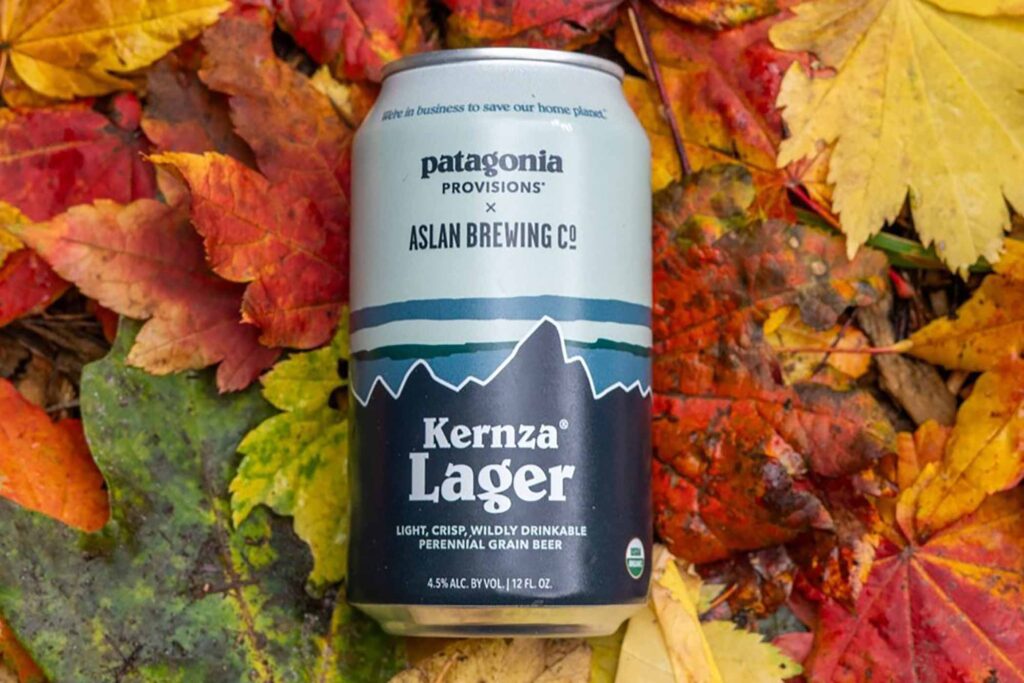
Photography courtesy of Aslan Brewing Co.
This project phase has several stipulations for participation: the brewing of a lager, use of regionally sourced organic ingredients, at least fifteen percent Kernza grain, local availability, and co-branding with Patagonia Provisions. Breweries must also donate 1% of the beer’s sales (matched by Patagonia) to local nonprofits supporting environmental initiatives that meet 1% for the Planet eligibility.
To provide the grain, Patagonia paired with early Kernza adopter A-Frame Farms in Minnesota, one of the few Regenerative Organic Certified® farms in the country and part of the Perennial Promise Grower’s Cooperative.
A-Frame Farms Owner and Farmer Luke Peterson emphasizes the value-aligned nature of the project. “We share a vision of what regenerative farming could look like in the future and understand the need to increase scale and build a market together,” he says.
However, Peterson quickly emphasizes the multiple challenges holding back Kernza farming on a larger scale. He explains the chicken-and-egg situation of selling Kernza, which keeps prices high.
“Our biggest challenge is marketing Kernza successfully to create enough demand to sell it at a price that is profitable so we can remain competitive and have access to land to continue to grow it,” he explains. “While Kernza yield is still low, it is difficult to get it into the supply chain to a level where we can do more research to learn more about using Kernza as an ingredient and find ways to ratchet up its yield potential.”
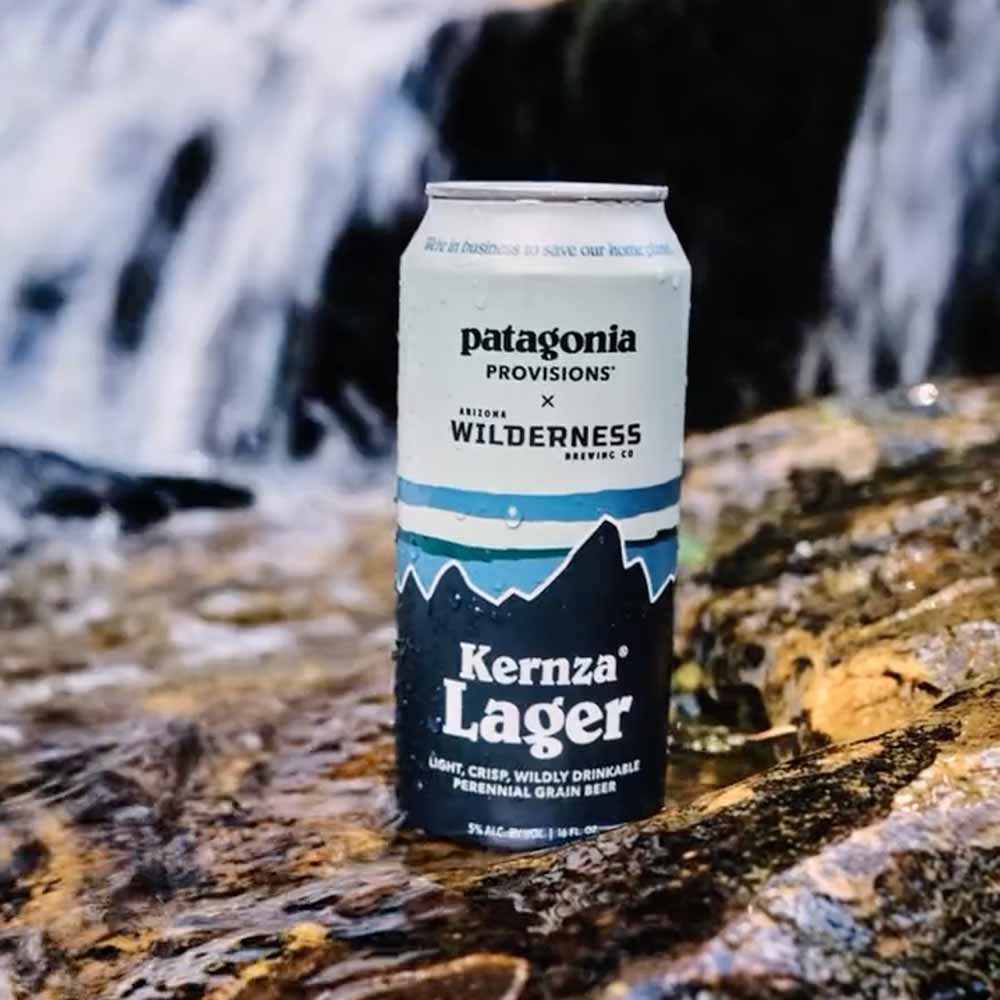
Photography courtesy of Patagonia Provisions
This issue also resonates with breweries. “Price was the main challenge using Kernza,” says Arizona Wilderness Co-Owner Patrick Ware. “With the per-pound value being six times normal grain cost, it pushes the cost of goods sold into the double/triple IPA range.”
Bang Brewing agrees. “When [Kernza] hit commercialization, it was seven dollars per pound,” says Boss Febbo. “[As an organic brewery], we’re accustomed to paying more for our ingredients, though this was significantly more.”
Nonetheless, all emphasize that this is a price worth paying for the environmental benefits Kernza yields, and Tammy Kimber at The Land Institute points to ongoing advances in research and development that are lowering costs. Additionally, USDA’s Natural Resource Conservation Service’s Conservation Stewardship Program #E328O offers payments to farmers producing Kernza, creating savings to pass on to breweries.
The other significant challenge of brewing with Kernza is the size and shape of the grain. Unlike common brewing grains, Kernza is much smaller and pencil-shaped, requiring specialist milling equipment.
However, the arrival of flaked Kernza could be a solution.
Kimber also highlights The Land Institute’s goal of developing the grain to be more user-friendly for brewers. “In the future, we anticipate the grain size will be bigger,” she says. “With more brewing-specific research and development in food science, processing, and applied technology, brewing with Kernza will be more accessible and practical.”
The size and scope of the project and the time and coordination involved in creating and sustaining new farming and production methods are undoubtedly among the biggest challenges in expanding Kernza production and brewing.
“Working with an experimental grain has been such a unique and eye-opening opportunity,” says Boss Febbo. “One growing season, one harvest, one processing at a time to learn how best to optimize things. Year over year. It’s happening.”
How Does Kernza Affect the Flavor of Your Beer?
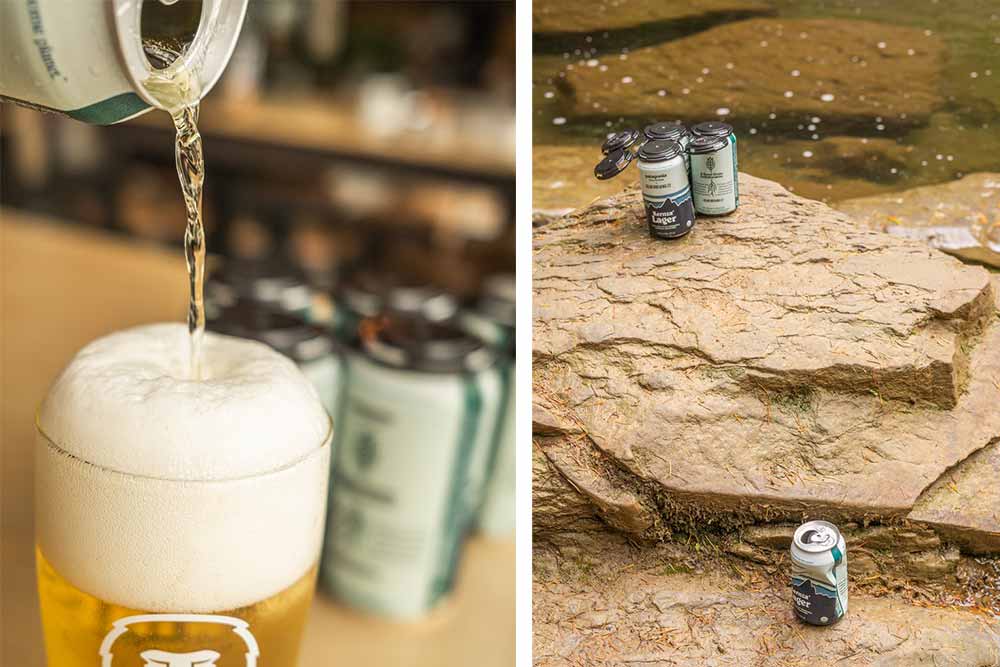
Photography courtesy of Aslan Brewing Co.
“The grain rewards the palate with flavors of wild rice, rye, and a slight nuttiness that is a truly unique accompaniment to the natural fruity and spicy nature of the hops,” says Ettinger at Hopworks.
With Kernza making up approximately fifteen percent of the grain content of the beers in the project, the flavor is not overwhelming but offers a subtle nuance to each beer’s existing flavors.
Odell’s unfiltered Kernza Lager has much more depth than your average light lager, which the Kernza’s gentle grain flavor balances out.
At Bang, Kernza’s nutty-spice notes enhance their crisp, bitter, hop-forward lager and adds toasty pine nut to Aslan’s crushable Kernza pilsner.
At Rhinegeist, their Kernza beer has a fresh floral aroma and bright, fresh-cut grass flavor punctuated with Kernza’s sweet-spice grain tang.
Arizona Wilderness’ clean, cereal-sweet lager has an earthy Kernza warmth, while Sierra Nevada’s Munich dunkel is a luxuriant, velvety-chocolate lager highlighting Kernza’s hazelnut qualities.
While each brewer and drinker will find different expressions of Kernza, its attributes resound across each beer, attracting praise across the board.
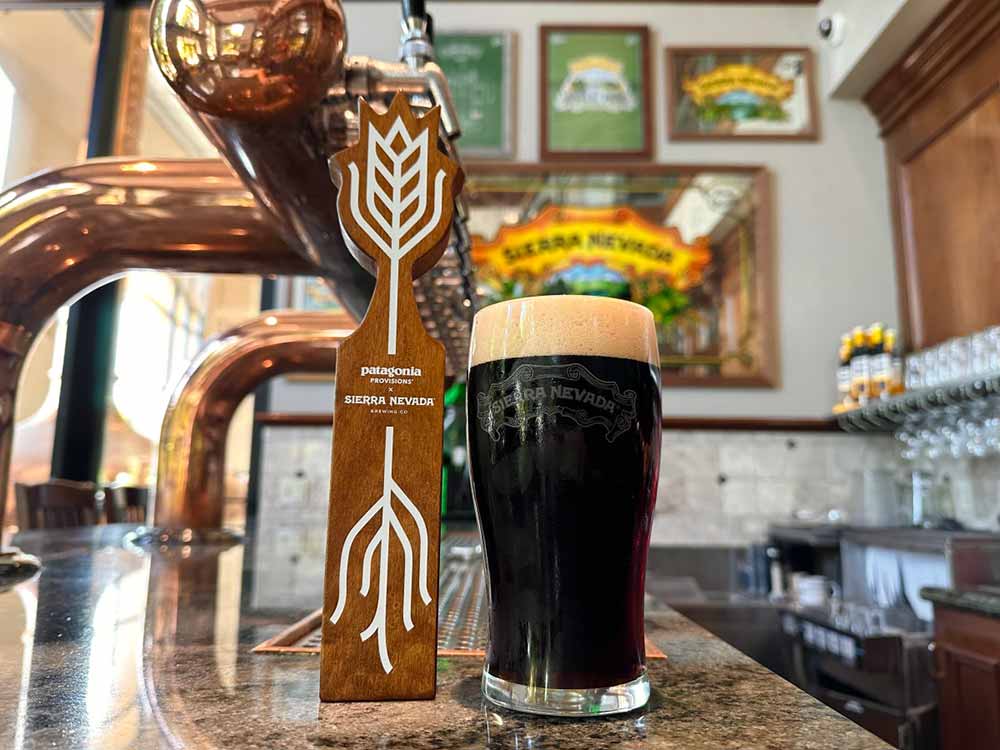
Photography courtesy of Sierra Nevada Brewing Company
“[Our Kernza Lager] was really well received by everyone who tried it in our taprooms,” says James Conery, innovation brewmaster at Sierra Nevada. “People seemed especially interested in the fact that it was a collaboration with Patagonia, which turned out to be a great way for people to learn about sustainable agriculture and what it could mean for the future.”
Marni Wahlquist, head brewer at Odell, agrees, saying, “The feedback has been positive, with drinkers really enjoying the flavor the Kernza adds to the beer.”
At Bang, Boss Febbo is enthusiastic about the beer’s reception. “People seek us out for organics and Kernza,” she says. “And for those that visit that haven’t heard about it—the response has been epic. Eyes light up when they see the eighteen-inch-long poster on our wall of the grain and its massive root structure in comparison to that of annual wheat.”
A-Frame’s Luke Peterson is also a big fan. “I’ve tried plenty of the beer and love its unique flavor profile,” he says. “And it really makes you feel good to relax and have a beer made the right way—it makes it easier to enjoy.”
Patagonia Provisions’ Hope for the Future
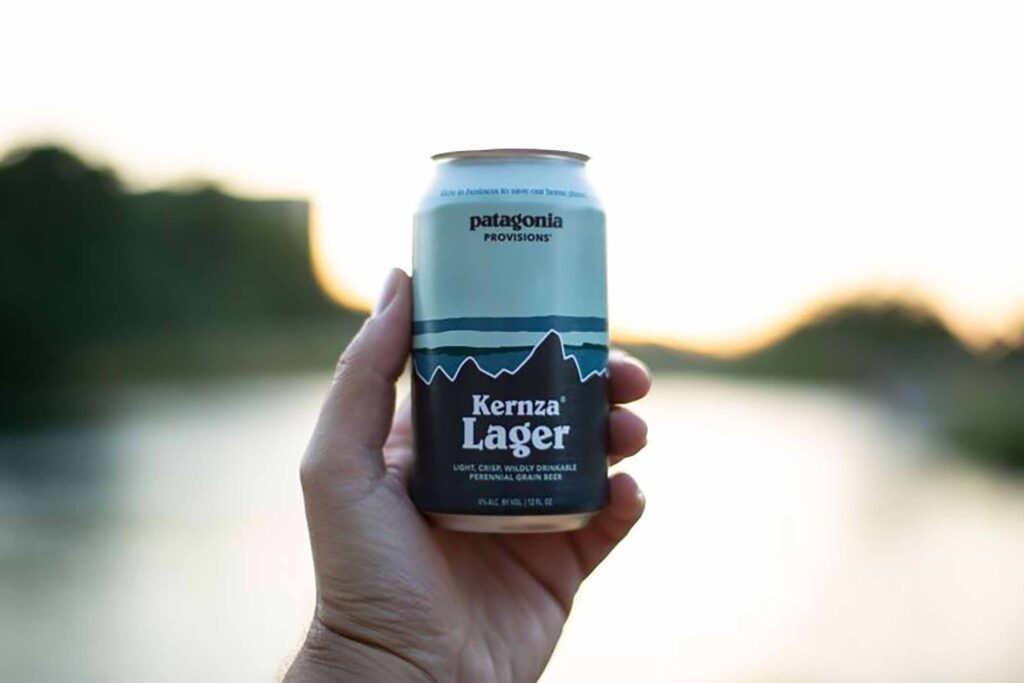
Photography courtesy of Patagonia Provisions
This sense of positivity, responsibility, and stewardship resonates throughout the project. From the breweries’ perspectives, the project has allowed them to be industry leaders, collaborate with like-minded colleagues, and fulfill their missions and values.
At Arizona Wilderness, Ware clearly states what the project means to them. “Regenerative agriculture has the ability to move our food production away from chemical-drenched carbon emitting barren soil to a future of nutrient-dense food that reverses the current deleterious effects of conventional agriculture,” he says. “After visiting [regenerative] farms, the difference is mind-blowing field to field. Ultimately, rewilding the landscape of America is the mission, and it’s a massive undertaking.”
At Hopworks, Ettinger agrees. “Patagonia is a leader in sustainability, and just as they have changed the conversation around apparel, they have also changed the conversation around food,” he says. “Being a leader is never easy, and it is important to take that risk when it comes to something as important and fundamental as our food system. Beer has been bringing people together for the last 9,000 years, and we hope that this gathering power will generate discussion and drive change with every sip.”
And change on a large scale is what is required. “Kernza will only become more common if consumers realize the need to incorporate crops that not only produce yield but produce ecosystem services—if they realize there is more to food than yield and low cost,” says Peterson.
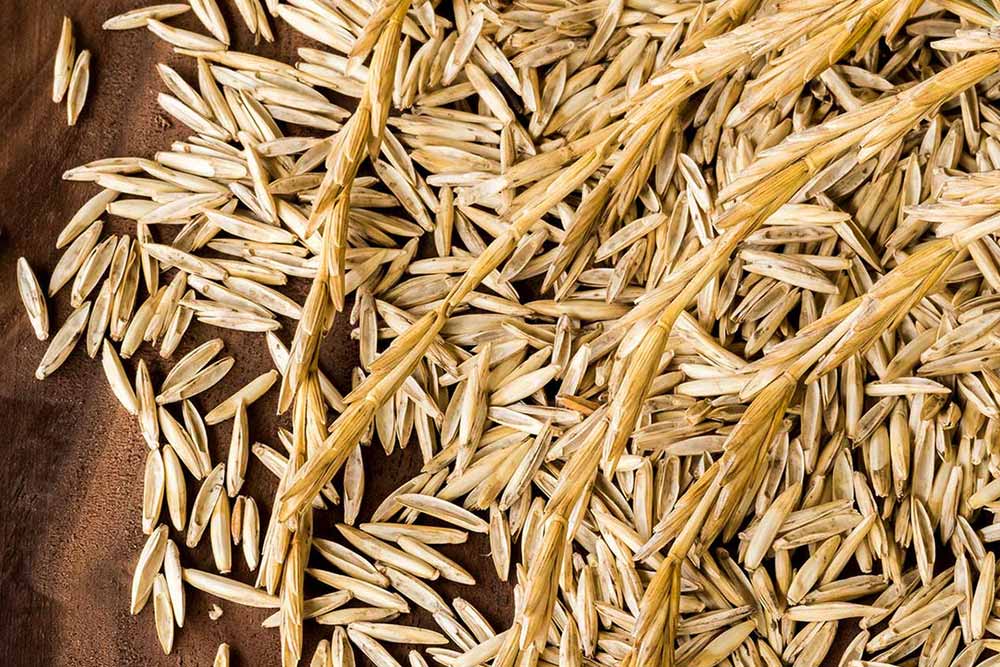
Photography courtesy of Patagonia Provisions
“It’s all about scale, and we are at the front edge of a big wave of regenerative agriculture that will reduce price and help Kernza move into more foods,” adds Ettinger.
Patagonia Provisions hopes to expand the program, bringing in more breweries to enhance these economies of scale and raise awareness among brewers and drinkers. “[The project] is a significant positive step for the industry,” says Lightfoot. “Our hope is that our beer program continues to grow, bringing on dozens more values-aligned brewery partners every year to deepen our positive environmental impact.”
With several of the breweries involved, including Bang, Arizona Wilderness, Sierra Nevada, Rhinegeist, Aslan, and Topa Topa, now packaging their Kernza beer for sale in local retail outlets, including Whole Foods, both access to and demand for the Kernza beer is growing, signaling positive signs for the future.
Boss Febbo sums up the feeling of hope about the project. “[A] really rewarding aspect of this collaborative is the opportunity to work alongside these impressive breweries in bringing this grain, these beers, to market together,” she says. “As a small brewery focused on brewing world-class beer as environmentally responsible as possible, the opportunity to work with an experimental perennial grain that yields beautiful results on so many levels has been an absolute joy.”
Want to Try a Beer With Kernza?
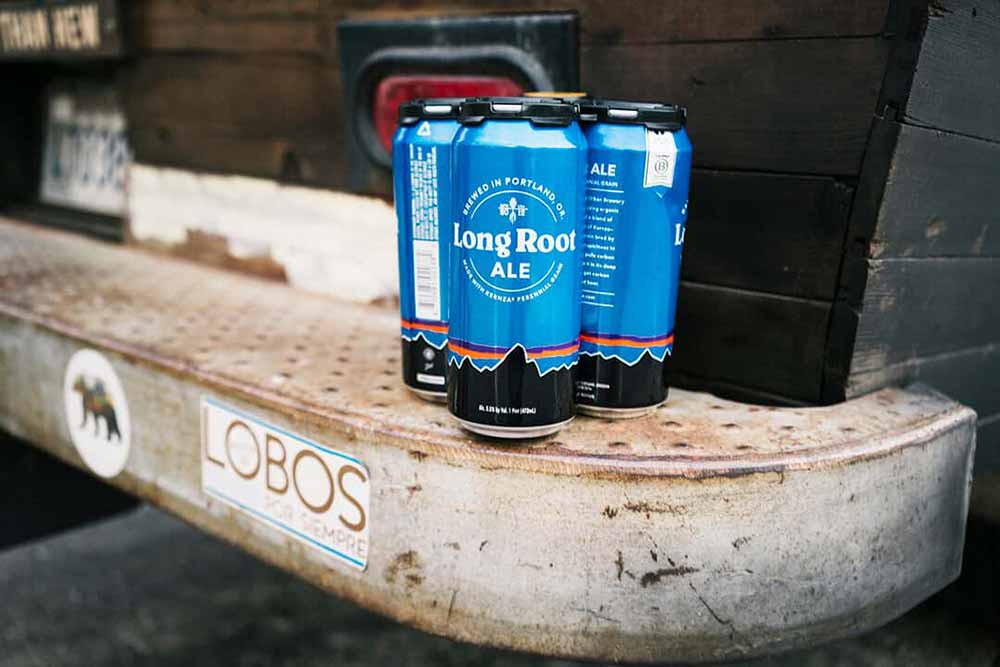
Photography courtesy of Hopworks Urban Brewery
These are the breweries currently participating in the project and the beers they’ve brewed with Kernza. Click on each button to learn more!
Allagash Brewing Company – Dry-Hopped Pilsner with Kernza®
Arizona Wilderness Brewing – Kernza Lager
Aslan Brewing Co. – Kernza Lager
Bang Brewing – Kernza Lager
Hopworks Urban Brewery – Long Root Ale
Maui Brewing Company – Kernza Organic Pilsner
Odell Brewing Co. – Kernza Lager
Rhinegeist Brewery – Kernza Lager
Russian River Brewing Company – Kernza® Beer
Sierra Nevada Brewing Co. – Kernza Lager
Topa Topa Brewing Co. – Patagonia Provisions Kernza Lager

